TALKING KAGAME/NKUNDA/GADDAFI
To Orwell Today,
Dear Jackie,
Muraho! Greetings from Rwanda and the Great Lakes Region.
It's been a long time we haven't heard from you -- hope you are well and we pray for your health.
I am sure the events happening all over the world are keeping you very busy.
I am a follower of your website, and with my friends we use your website for learning about world politics as it is very educative.
For quite some time now you haven't talked about this part of the world, but we understand as you cover almost all places where injustice is prevailing -- it is not easy to always cover our region.
I am sending a piece of writing which, if you think is right, you can post on your website for ORWELL TODAY readers who follow the Great Lakes news -- Rwanda and Congo in particular.
Muraho! Amahoro y’Imana
by Jean Claude Ganunga, January 31, 2012
Today is a special day to me, as I saw the Devil Leon Mugesera handcuffed arriving in Rwanda to a country and the people he betrayed with his famous speech.
I tell you this man is/was at the core center of Rwandan Genocide, as he was among the designers of this horrible politics. Seeing him escorted by young Rwandan Police is a great relief to many terribly hurt souls.
I thank the people and the Government of Canada for such a heroic act, though it was late to come, but I say 'better late than never', and I wish other nations could learn from such an example.
After listening to part of his famous speech, I was shivering on how a person of this generation with such a personality, a civilized person with proper education, could say such words -- and moreover he can get other people to listen to him and even to follow. Thank God there were still some sensible Rwandans at that time and now the justice will prevail. I tried to put his audio speech here but my IT ability failed me.
Today also I had some time to read part of the findings of Judge Marc Trevidic, with the proper investigation he conducted unlike his predecessor who I can't believe him to be a Judge. We have at last some logical explanation as to what could have happened on that fateful day in 1994 April. And this news is proof of what we had been knowing all along except the deniers who were trying to hide their role and the role of their masters. These two articles are very informative and are a must read by all friends of new and progressive Rwanda. God is Great and Rwanda will prevail.
Africa: Some Truth and Justice for Rwanda at Last, by Gerald Caplan, AllAfrica, Jan 12, 2012
(http://allafrica.com/stories/201201130948.html)
Rwanda: a step towards truth, by Andrew Wallis, Open Democracy, Jan 21, 2012
(http://www.opendemocracy.net/andrew-wallis/rwanda-step-towards-truth)
I am going to touch on another issue which could be very delicate to many followers of this website, but please don’t be offended -- you can argue your points against what I am about to reveal. I am a Rwandan first, and an African later. At the time of our greatest need, no one bothered to come to our help -- not even our neighbors, some even had to shut their borders in order to prevent us from surviving. So when we deal with issues concerning our security we have all the right to put it first and foremost to anything -- I hope we have earned the right to do so.
The issue of General Nkunda is the one I want to share my opinion with you. When he was fighting in Congo, winning battle after battle, he was using Rwandan soldiers -- more than 70% of his Army and the strongest part of his hard fighters were Rwandans. The 30% remaining, who would hardly want to go to the frontline when things got so hot, were the Congolese. The Rwandans were there to protect some vulnerable groups of people -- but moreso to protect their motherland. That was why, when these forces were recalled back home, Nkunda had no army so the only secure route was to go with them. The alternative was to be captured by Kabila using the 30% remaining of his own soldiers after they'd been bribed.
The route he chose was the most logical one -- at least he is alive and safe. He is not in a cell, as many people believe, he is very safe and comfortable. So I think this is not what you may call stabbing him in the back.
If you take some time and analyze, and then balance the situation at that time and the events that followed all over the world afterwards, it was just a perfect solution. In fact Nkunda had even started to forget his strength and was negotiating with French and British Ministers forgetting or disregarding the security of Rwanda. Unfortunately their negotiations had some hidden agenda. European super powers under the leadership of France were squeezing Rwanda and its President, even Obama had issued an ultimatum, you could see or hear a report after report tarnishing the image of Rwanda, all these were in preparations for something sinister towards Rwanda and its president and Nkunda as well. Neighboring countries were being used and prepared -- one country even prepared a force and made it standby to go into Congo for the only purpose of abducting Mr. Nkunda in a well organized commando raid. This was to be conducted during one of these meetings with delegates from the superpowers.
Had Rwandan leadership continued with the fight backing Nkunda, I am afraid the result could be catastrophic to the people of Rwanda. Of course initially there could be some positive achievements in the battlefield but sometime after things could have turned upside down as some superpowers were preparing a decisive blow. Thank God our leadership had vision and many good plans to fall back to. They decided to back down and pull out their boys and safeguard their border from inside. Nkunda had no alternative except to take the safest plan provided to him. This, as a result, prevented the plan which was being prepared by France and Obama to do what exactly they did later to Muammar Gaddafi. The motive for France was obvious at the time, but someone could ask why Obama? The answer lies deep in US Democrats policies and campaigns, for those who followed his Democratic Party, and even his presidential campaign, could understand what I am saying. Almost all or many African countries supported him but there were some few who did not!!
There were many plans being cooked and tricks played by some superpowers with alot of reports being produced to prepare the ground and justifications of their evil plans towards Rwanda and our leader. Also, here was an opportunity for an afro American President to make a strong statement.
So after those very anxious and tricky moments, Rwandan leadership made a very broad and foresighted decision out of which Rwanda now is safe and progressing very well: the true report on the April 1994 plane crash is out; Bruguiere is no longer credible enough to continue spreading his lies; Congo, though not safe but somehow better; Nkunda is safe and sound -- he moves around, some lucky people have even managed to see him not only once. What else could they have done?
~ end of document ~
Thanks Jackie for posting my document. And welcome back to Kigali. The City is even cleaner and nicer than when you last visited, its people are slightly well economically too. In the rural areas it is even better as now Rwandans can satisfy their food requirement -- we owe this to a good leadership. Some very good programs initiated and pioneered by Rwandan leadership are bearing fruits: Land use consolidation, CIP etc are succeeding. Through education programs every Rwandan now attends school at least up to A-Level for free; Health Insurance is 100% to all citizens; his HE program of one exotic cow per poor family is fast becoming a miracle to those poor families.
Thanks and God bless you,
Jean Claude Gahunga
Greetings and muraho Jean Claude,
Yes, it has been awhile since I've talked about Rwanda or Congo on ORWELL TODAY but I still follow happenings in the Great Lakes Region with great interest -- especially wondering about Nkunda and how he is doing -- and how his people in the Congo are doing without him. In September I posted quite a few articles, which I've linked at the bottom of the page.
And of course, a couple weeks ago, on January 22nd, 2012 I thought very much about the Great Lakes Region because that was the day, three years ago in 2009, that Nkunda was kidnapped in Rwanda and put under house arrest. Since that time he hasn't been seen or heard from by journalists wanting to interview him or the Rwandan leadership about his situation.
So I do very much appreciate receiving your email and document updating the world on news about Nkunda. You say he is safe and free to move around and that people have seen him and I'm wondering if you yourself have seen him? I'd like to believe it's true but as a journalist I'm skeptical without proof.
Your analysis of the situation in Congo surrounding Nkunda's arrest differs from what I understand to be the case but my opinion is posted on my website for all to see and it's important to hear your thoughts too as you are there "on the ground", as they say, in Rwanda.
Yes, it was good news that the genocidaire Mugesera -- of "kill the Tutsi cockroaches and dump their bodies in the Nyabarongo river" fame* -- was finally deported from Canada back to Rwanda. The main insult is that it took so long and he was sent home by private jet -- that must have cost the Canadian taxpayers untold thousands -- most of us here can't afford a lawyer when we get into trouble -- legal aid is what most resort to -- and we fly economy class, not first class when we travel.
I must say, I was surprised when Mugesera appeared in Rwandan court a few days later in a fancy suit and not the pink outfit most prisoners usually wear -- and apparently he can phone his wife and five children in Canada anytime he feels like it.
Disgusting, also, is that Mugesera -- a mastermind genocidaire -- got his day in court so quickly. And yet Nkunda, who fought against the genocidaires Mugesera incited -- and who protected Rwanda's borders from genocidal Hutus planning to go back and "finish the work" -- has not yet had his day in court. See HOW OR WHERE IS NKUNDA?
Frankly, I won't be following Mugesera's case -- as far as I'm concerned they can lock him up and throw away the key -- but he'll probably get off like Habyarimana's brother-in-law Mr Zed and various other top-level genocidal masterminds. See EX-FIRST LADY DENIES GENOCIDE & KILLING FOSSEY LEAST ZED CRIME
Sorry to be so cynical but the UN Criminal Court in the Netherlands and Tanzania is itself a criminal court -- and it sounds like the Rwandan trial of Mugesera will be dragging on for months or years too and costing who knows how much to the taxpayers or whoever's paying the government lawyers.
You mentioned Muammar Gaddafi in your document and that brings up another sore point I have with Kagame which is that he was one of the first African leaders to jump on the UN bandwagon approving the UN bombing of Libya. And it rubs salt in the wound considering that it was Gaddafi who helped fund the Rwandese Patriotic Army -- supplying weapons flown in from Uganda from 1990 to 1994 thereby helping Kagame stop the genocide.
And Gaddafi helped Rwanda in many other ways, including in telecommunications. All of Africa owes thanks to Gaddafi that they have somewhat affordable cell phone and computer connections because Gaddafi put up a satellite in space for all of Africa to use, instead of having to pay exorbitant prices to connect to the established satellites. And of course, it goes without saying that Gaddafi created the 8th WONDER OF THE WORLD -- the GREAT MAN-MADE RIVER turning desert into farmland and pumping as much water as flows for two hundred years through the Nile (of which Rwanda is the furthest tributary). See GREAT GADDAFI MAN-MADE RIVER & REMINISCING DISCOVERY NILE & CONGO & FLYING IN LIBYA NO-FLY ZONE
And it's a bad situation in Congo since Nkunda is no longer there to lead the rebellion against Kabila's totally corrupt tyranny.
Congo's resources (like ours in Canada) have been sold down the river to the Communist Chinese just like Nkunda said they would be -- and Rwandan Hutus and Kabila soldiers are still massacring Kivu civilians -- with the UN standing by and watching as usual. See NKUNDA SAY CONGO OWNS RESOURCES
I know I sound bitter, and am going to sign off now -- just had to get that out in the open, now that we're talking about it.
All the best and amahoro y’Imana,
Jackie Jura
African Union embraces Beijing now Gaddafi gone
(Africa resources fuel Red China economic growth)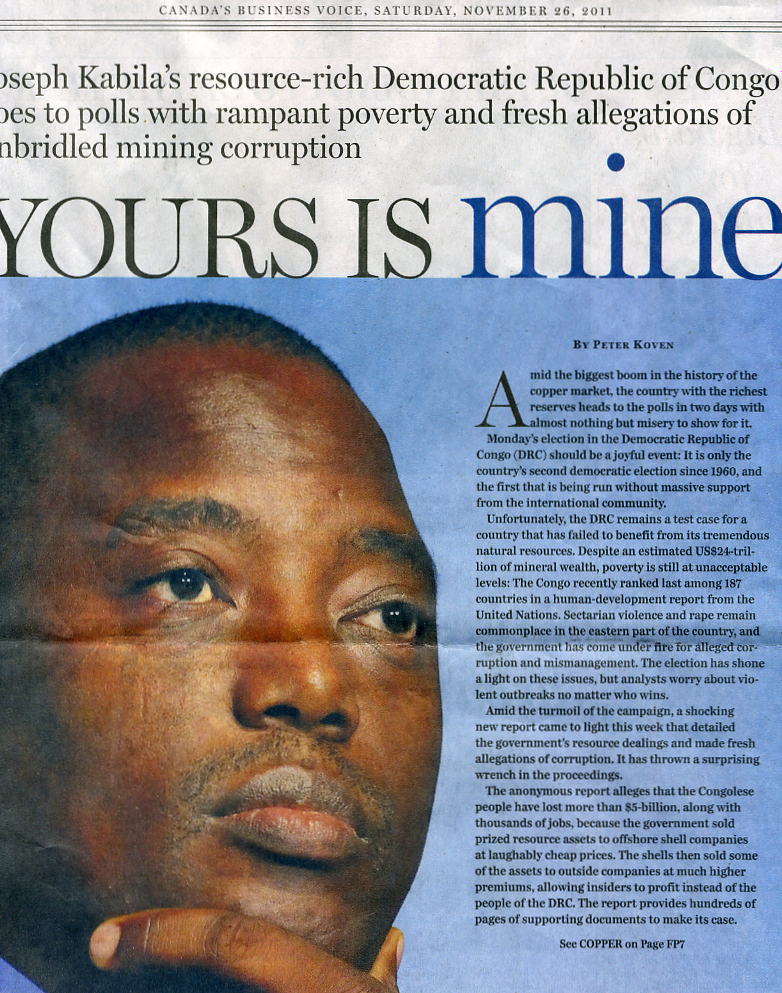
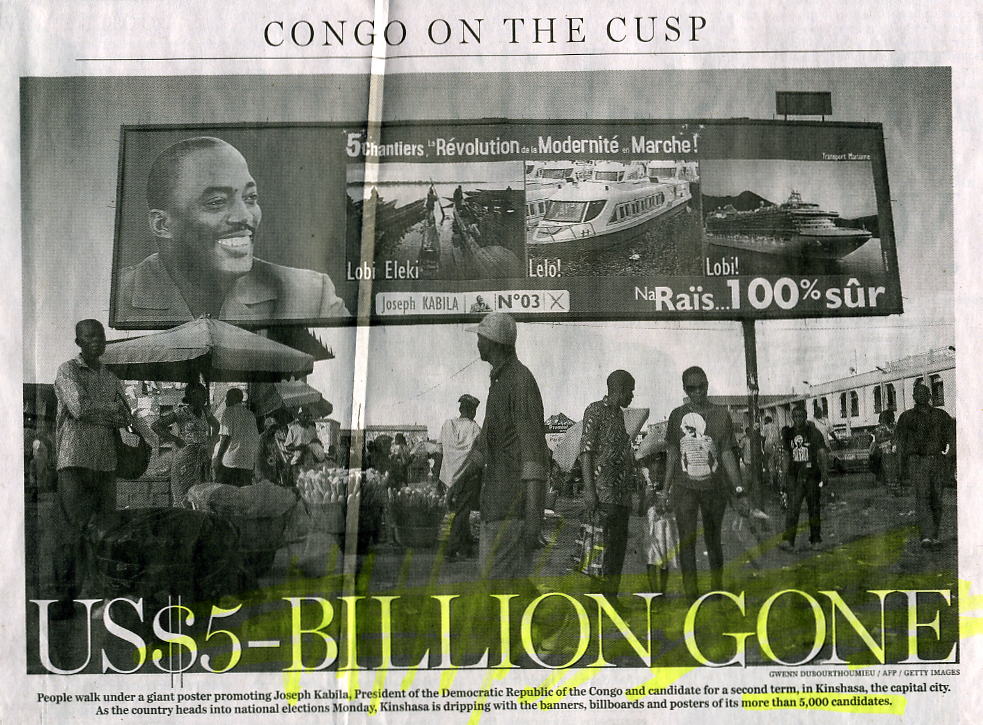

Kabila to Congo: Yours is mine
(richest resources/rampant corruption/poverty)
What happened to Congo's Nkunda?
(arrested in Rwanda without trial 3 years ago)
Canada deports inciter of Rwandan genocide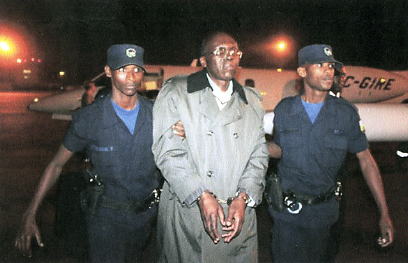
(kill Tutsi cockroaches/dump in Nyabarongo river)
Thousands Rwanda dead wash down to Lake Victoria
(bodies carried by river current for weeks: 1994)
Gazette/Huff/NatPost/NYT, Feb 11, 2012
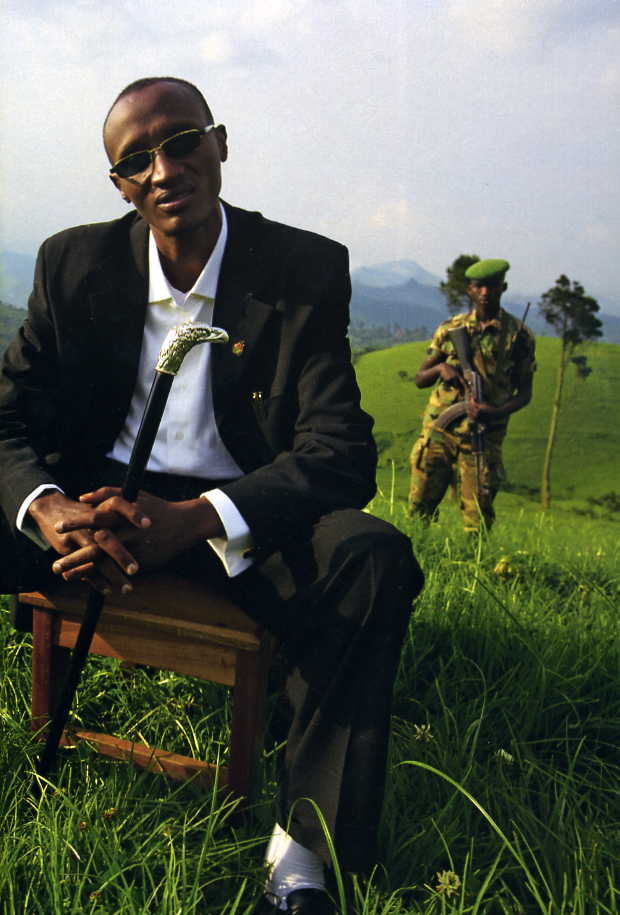

TALKING KAGAME/NKUNDA/GADDAFI
& 6.SuperState Disputed Territories
Deported Rwandan charged with plotting genocide, Radio Netherlands, Feb 2, 2012
A Rwandan sought by the authorities in Kigali over the 1994 genocide and deported by Canada after a long legal battle, was charged Thursday with plotting genocide, incitement and distribution of arms. Leon Mugesera, who had been fighting his deportation to Rwanda for the past 16 years, asked for more time before entering a plea on the grounds that he does not yet have a lawyer. "I'm not ready to begin," Mugesera told the court. He appeared relaxed and even smiled as he arrived at the court in Kigali, wearing a smart grey suit and handcuffs. "I need more time to find a lawyer. I've asked the prosecutor to wait. Within one or two months I will know who my lawyer will be." President Paul Kagame said he was certain the trial would be fair. "I have no doubt that the case will be handled to everybody's satisfaction," he told reporters. The case was adjourned until April 2, when Mugesera will enter a plea. His request for bail in the interim was refused. Mugesera, now 59, made an infamous speech in 1992 that allegedly played a major role in sparking the 1994 genocide, in which radical ethnic Hutus killed as many as 800,000 Tutsis. Mugesera, a linguist, allegedly called Tutsis "cockroaches" and "scum," and encouraged his fellow Hutus to kill them. He had lived in Canada since 1993 before his return to Rwanda last month.
African Union embraces Beijing now Gaddafi gone, GlobeMail, Jan 30, 2012
Weakened by chronic infighting and the demise of its long-time financier Moammar Gadhafi, the African Union is turning instead to the embrace of its richest new ally: China. Col. Gadhafi, the Libyan dictator who was overthrown and killed last year, had been the biggest donor to Africa’s political alliance for years. But at its latest summit this weekend, the AU made it clear that Beijing is its new Libya. The 54-nation African organization is holding its summit in its gleaming new $200-million marble-and-glass headquarters, financed and built by the Chinese government on the site of a former maximum-security prison in Addis Ababa. It’s the tallest building in the country, and all of it – even the furniture in its spectacular 2500-seat Grand Hall – was supplied by China as a gift to the world’s poorest continent. The honoured guest and keynote speaker at the African summit is a senior Chinese official, Jia Qinglin, who announced on Sunday that China will provide $95-million in funds to the AU over the next three years – a huge boost to an organization whose annual budget is about $270-million. “The people of China and Africa are good friends, good partners and good brothers,” Mr. Jia told the summit. “Our friendship is as solid as the towering Mount Kilimanjaro and as vibrant as the Yangtze River and the Yellow River.”
During the Gadhafi years, many African nations came to depend heavily on gifts and investments from Libya’s oil wealth. Libya provided 15 per cent of the AU’s membership revenue, and it paid the entire dues of many smaller and poorer African nations. It also spent billions of dollars on infrastructure programs and other investments across Africa to help cultivate support for Col. Gadhafi’s vision of a United States of Africa. Now, however, that vision is dead, and Africa is turning instead to China. At the summit, African leaders were quick to praise China as a model for their continent. Ethiopian Prime Minister Meles Zenawi, speaking at the unveiling of the Chinese-built headquarters, said the recent rapid growth of many African nations was a result of their adoption of Chinese-style economic policies.... Perhaps most important, China attaches no strings to its aid to Africa, making no burdensome Western-style demands for democracy or anti-corruption campaigns. Its aid, however, helps Beijing win access to the African oil and minerals that are increasingly vital for fuelling China’s economic growth...
Curious Rwandans greet Mugesera after deportation, Montreal Gazette, Jan 26, 2012
After his high-profile exit from Canada following a 15-year legal battle, genocide suspect Léon Mugesera was greeted by crowds of curious onlookers, police and a throng of reporters when he touched down in Rwanda late Tuesday after more than two decades abroad.... Mugesera, 59, is notorious in Rwanda as a political figure who is accused of inciting Hutus to exterminate Tutsis through an inflammatory speech he delivered at a political rally two years prior to the 1994 genocide. He is alleged to have degraded Tutsis as "cockroaches" and said they had to be killed and thrown into the Nyabarongo River.... His deportation from Canada has been welcomed by Rwandan authorities, who have commended Canada for the move.... The reaction of Ibuka, Rwanda's association of genocide survivors, to the deportation also was swift. "He is among the planners of the genocide. What he said had an impact during the genocide," claimed Janvier Forongo, Ibuka's executive secretary. "Many people were thrown into rivers in the whole country during the genocide. People put into practice what he said. I wish he'd be tried in the village where he gave his speech." Police spokesperson Theos Badege said Mugesera was to stay at a police facility for no more than 72 hours before being questioned by the prosecution. According to Rwanda's standard judicial process, it may take up to 10 days before Mugesera appears in court for the first time.
What happened to Congolese General Laurent Nkunda?, by Georgianne Nienebar, Jan 20, 2012
...In three years, no one has heard from Nkunda after his betrayal by Rwanda's Paul Kagame in a mutually beneficial alliance with Congo's Joseph Kabila. Paul Kagame's press office has not responded to repeated requests for an interview.
Contrary to news reports at the time, Nkunda was not on the run, nor had he been ousted in a coup d'état by the war criminal Bosco Ntaganda. Against the advice of advisors, Nkunda went willingly to a meeting called in Rwanda to consider peace talks. Associates suspected a trap, and they were correct. But a "renegade" general "on the run" is a compelling story. Today, Nkunda is being held under house arrest in Rwanda with no criminal charges pending against him. A petition filed by his lawyer in the Supreme Court of Rwanda in March 2010 says Nkunda:
...was arrested on or about January 22, 2009 by members of Rwanda Defence Forces of Rwanda (RDF), and remains to this day held by the Rwandan authorities, and without appearing before a judge so that he can be informed of the reasons for his arrest and detention....Laurent Nkunda was arrested while attending a formal meeting to which he had been invited to participate...
This document has been recently scrubbed from the ICC website. The Hague has not responded to our request for an explanation. One explanation might be that the complete petition demonstrates that Rwanda is in violation of its constitution, since it holds Nkunda with no criminal or civil charges filed against him.... See NKUNDA LAST CONGO INTERVIEW
Congo in the Cusp, Yours is Mine, National Post, Nov 26, 2011
Amid the biggest boom in the history of the copper market, the country with the richest reserves heads to the polls in two days with almost nothing but misery to show for it. Monday's election in the Democratic Republic of Congo (DRC) should be a joyful event: It is only the country's second democratic election since 1960, and the first that is being run without massive support from the international community. Unfortunately, the DRC remains a test case for a country that has failed to benefit from its tremendous natural resources. Despite an estimated US$24-trillion of mineral wealth, poverty is still at unacceptable levels: The Congo recently ranked last among 187 countries in a human-development report from the United Nations. Sectarian violence and rape remain commonplace in the eastern part of the country, and the government has come under fire for alleged corruption and mismanagement. The election has shone a light on these issues, but analysts worry about violent outbreaks no matter who wins.
Amid the turmoil of the campaign, a shocking new report came to light this week that detailed the government's resource dealings and made fresh allegations of corruption. It has thrown a surprising wrench in the proceedings. The anonymous report alleges that the Congolese people have lost more than $5-billion, along with thousands of jobs, because the government sold prized resource assets to offshore shell companies at laughably cheap prices. The shells then sold some of the assets to outside companies at much higher premiums, allowing insiders to profit instead of the people of the DRC. The report provides hundreds of pages of supporting documents to make its case. These shell companies have a few things in common, according to the report: They are based in the British Virgin Islands (BVI) or Gibraltar, they have no expertise in resource development, and many of them are linked to an Israeli businessman named Dan Gertler, who has close ties to Congolese President Joseph Kabila....The election is going down to the wire, even though Mr. Kabila has tried to give himself an edge. Earlier this year, he changed the law to eliminate a run-off vote, which allows him to benefit from a divided opposition. He easily won the last election in 2006, but his support has eroded since then as the people of the Congo continue to suffer. "People are increasingly asking why the government can't provide security, provide roads, or provide economic growth. That is becoming the focus," Mr. Stearns said....The International Monetary Fund extended a US $551-million loan to the Congo in 2009, and one of the conditions was that the government provide more transparency in its resource sector. "It would seem that some of these [BVI] sales have been carried out in violation of that condition," Mr. Stearns said. However, the IMF has yet to make a fuss about the deals, even saying in April that the government is making progress in its transparency....
listen JACKIE JURA INTERVIEW GADDAFI CRYSTAL SPIRIT, Oct 24, 2011
Tears as Uganda Muslims pay respect to Colonel Gaddafi (accuse UN of killing Gaddafi for Libyan oil) & Gaddafi mourned at magnificent mosque he funded (a benefactor/special friend/guardian to Uganda) & Malta ex-PM feels deep sorrow/repugnance at Gaddafi death (protected Libyans/resisted UN attacks/didn't surrender). News, Oct 21-22, 2011. Go to GADDAFI: RECOLLECTIONS OF MY LIFE
President Kagame stays in £12,000/night hotel room
(Rwanda receives £80-million/yr in aid from UK)
UN cutting support to all Rwandan refugees living abroad
(UN says Rwandan refugees should go home to Rwanda)
Tutsi refugees in Rwanda prefer death at home in Congo
(fighting Hutus/MaiMai better than fighting hunger)
Nkunda to be secretly handed over to Congo from Rwanda
(fought Hutu/MaiMai/UN/Kabila forces killing Tutsis in Congo)
Rwanda fears death penalty extraditing Nkunda to Congo
(held under house arrest in Rwanda since 2009)
54,000 Congo refugees starving in Rwanda UN camps
(fled on-going massacres by Rwandan Hutus in Congo)
UN begs for money to feed Congo refugees in Rwanda
(need $4-million for 2,500 tons food for 54,000 people)
It pays to be at war for UN peace-keepers in Congo
(18,000 UN-troops keeping-war in Congo as livelihood)
Gorilla smuggling increasing in Congo & Rwanda
(big demand for baby mountain gorillas)
RwandaNews/AFP, Sep 14-18, 2011
watch NKUNDA LAST CONGO INTERVIEW
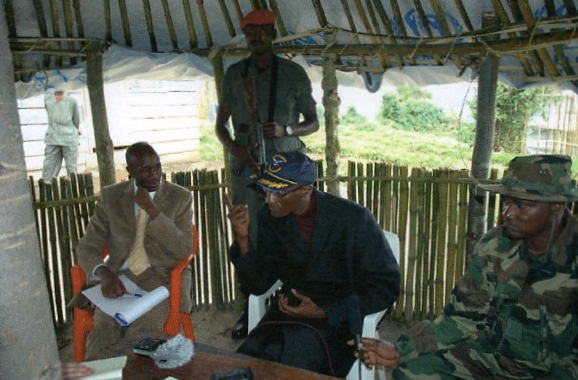
HOW OR WHERE IS NKUNDA?
& KAGAME HELPING NKUNDA NOT
& NKUNDA FIGHTING FOR PEACE
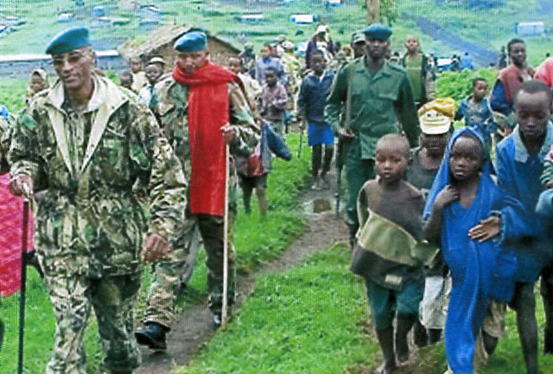
NKUNDA CONGO'S ONLY PROTECTOR
& NKUNDA SAY UN CRIMINALS IN CONGO
& KABILA KILLS, RAPES & BLAMES NKUNDA
& NKUNDA ARREST PUTS GORILLAS AT RISK
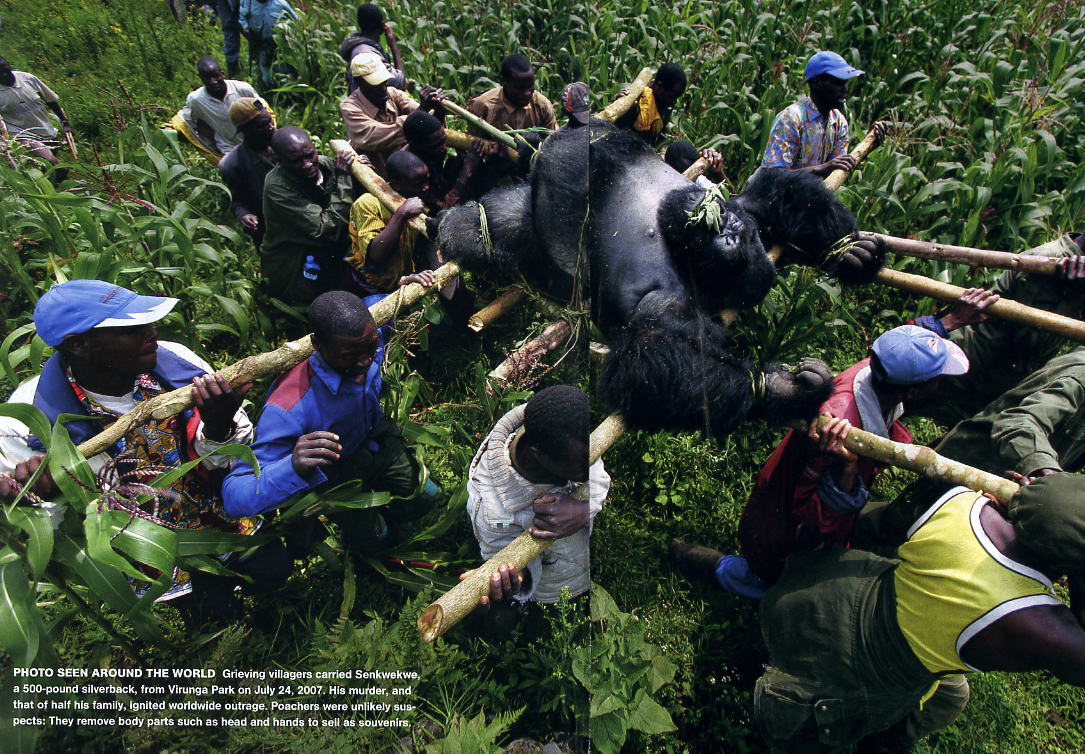
VISITING RWANDA'S RARE GORILLAS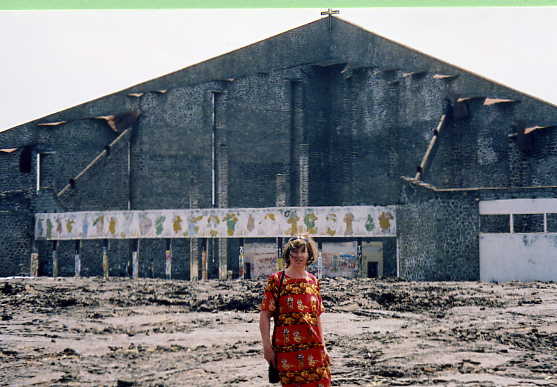
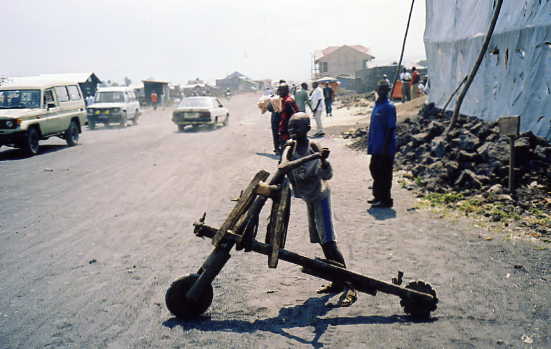
SLEEPING ON LAVA IN CONGO RAIN
KNOW NKUNDA CONGO
watch ORWELL TODAY LIBYA WATER VIDEO, Jackie Jura radio interview, Aug 18, 2011
What all friends of Africa should know (UN vs Gaddafi). Mathaba, Jun 18, 2011
...When African nations called, Qadhafi answered. He is passionate about the plight of Africans and Africa and longs to see the liberation of the continent and its people. He called on the African Union to give representation to Africans in the Diaspora – the US, Europe, the Caribbean and South America, and acknowledged the need to deal with the conditions of poverty, underdevelopment and marginalisation that continues to confront these communities. At a recent conference held in Libya in January this year, to address the needs and concerns of African migrants to Europe, Qadhafi stated: “From now on, by the will of God, I will assign teams to search, investigate and liaise with the Africans in Europe and to check their situations… this is my duty and role towards the sons of Africa; I am a soldier for Africa. I am here for you and I work for you; therefore, I will not leave you and I will follow up on your conditions.
Today, Qadhafi is seen by Africans on the continent and throughout the diaspora as a leading Afrocentric Pan-Africanist, articulating a vision for a United States of Africa – with one government, one currency and one army. One of Muammar Qadhafi’s most controversial and difficult moves has been his determined drive to unite Africa with a shared vision for the true independence and liberation of the entire continent. He has contributed a great deal of his time, energy and large sums of money to this project, and like Kwame Nkrumah, he has paid a high price. Answering Qadhafi's call, Libya deposited $32 billion into a $42 billion fund for the creation of a national African Central Bank (HQ to be in Nigeria), African Monetary Fund (HQ to be in Cameroun) and African Investment Bank (HQ to be in Libya), to fund health, education and communications infrastructure projects across Africa. This money, along with 45 billion Euros and even yet more billions of dollars, was confiscated by the U.S. and European countries during the past month, to prevent the 2011 launch of Africa's own non-private supra-national monetary system. In 2007, reports also indicate that Libya contributed $300 million of a total $377 million to launch Africa's first and only communication satellite, saving Africa's 53 states around $500 million in annual fees that used to be paid to non-African communication satellites. As a result, the cost of phone calls to and from Africa, dropped drastically, providing yet another dent in the coffers of her former colonial masters in the West....
Gaddafi patron saint to 31 sub-Saharan African countries, UgandaVision, Apr 12, 2011
Nairobi — In January this year, an organisation calling itself the House of Traditional Elders of Kenya held court with Libyan strongman Col Muammar Gaddafi. Led by its chairman, Mr Kamlesh Pattni of the Goldenberg infamy, they presented a Sh100-million proposal to the now embattled president. It is, therefore, not surprising that the organisation's vice-chairman, Mr Riaga Ogallo, has condemned the ongoing bombardment of Gaddafi's forces by Western powers....With rebels pushing towards Tripoli, thanks to an unrelenting bombardment of the loyalist troops by a coalition of European powers, arrangements such as the one Gaddafi has with the Kenya elders could go up in smoke. And that would be the case across the continent....
In a bid to entrench Libya at the economic and political heartbeat of several African regions, the Libyan despot established several investment vehicles using the country's petroleum revenues. Under the Libyan Investment Authority (LIA), the country's sovereign wealth fund believed to be capitalised at approximately $65 billion (Sh5.5 trillion), the North African nation has established numerous subsidiaries whose tentacles embrace hotels, oil exploration, mining, tourism, agriculture, and infrastructure in at least 31 countries. Subsidies under LIA include the Libyan Arab Foreign Bank (LAFB), the Libyan African Portfolio for Investments (LAP), the Libyan Arab African Investment Company (LAAICO), and Tamoil, whose African operations run under the OiLibya brand. According to a leaked US diplomatic cable, from 2010 the scale of investments in Africa is in the region of $5 billion (Sh415 billion.)...
Alongside the economic alignments, Muammar Gaddafi has been trying to push for a United States of Africa through the AU and later through a group of traditional leaders which he had assembled under the auspices of the Forum for African Traditional Leaders (FATL). As part of his agenda, Gaddafi used to host members of FATL in the now rebel-held city of Benghazi every year, where he lavished them with gifts and promises of development funds. As a vote of thanks, this congress of chiefs and tribal leaders crowned their flamboyant benefactor as the "King of the Kings of Africa" in 2008. The prospect of losing access to Libyan oil dollars is perhaps the reason Toro kingdom Queen Mother and FATL secretary general, Best Kemigisa, is one of the most aggrieved women in Uganda. Gaddafi spent millions of dollars in renovating the palace of Toro King Oyo Nyimba at Fort Portal. He is also said to have paid for the 19-year-old king's education at a prestigious London school. The Queen Mother, who describes Gaddafi as a revolutionary pan-Africanist who has led from the front in financing development projects across the continent, is also appealing to African members of the FATL to support Gaddafi in crushing the rebellion. "He needs us more than ever before. As cultural leaders we should not sit and just watch him being hurt," Kemigisa explained in an interview with Uganda's Sunday Vision. "He has always been there for us and supported cultural institutions. We need to do something to help him resolve the crisis."
Gaddafi is also said to have close ties with the kingdom of Buganda, where he channelled his handouts through Prince Kassim Nakibinge. Apart from money pumped in through the traditional leaders, Uganda is one of the countries in Africa that have benefited the most from Libyan largesse in recent years. However, the fate of Uganda's relatively robust economy is in no way tied to Gaddafi's fate, in spite of sizable Libyan investments there. From investments to philanthropy, Gaddafi's footprints are evident in Uganda. In March 2008, the Libyan leader visited Uganda amid huge fanfare to open a multi-billion dollar mosque, famed to be the second largest in Africa with a capacity to accommodate 15,000 worshippers. Of course, he had financed its construction. Perched on Old Kampala Hill, Gaddafi Mosque remains one of the most poignant symbols of Libya's geo-politics in Uganda. With the flamboyant leader having promised to finance the refurbishing and maintenance of the mosque for the next 10 years, there is uncertainty about what will happen if Tripoli falls. "May Allah protect and help our brother (Gaddafi) emerge victorious because I don't know whether we shall be able to maintain the mosque without his support," Meddie Akhram, a worshipper, was quoted as lamenting.... The Libyan government is also said to be laying the groundwork for the construction of a $300 million (Sh25 billion) oil pipeline from Mombasa to Kampala.... Although Gaddafi's dalliance with traditional kingdoms and his push for a United States of Africa have created a rift between him and his Ugandan counterpart, President Yoweri Museveni has come out strongly in defence of his ally against the UN-sanctioned pummelling by American and European forces. Gaddafi funded and armed the bloody Amin regime, but he later switched sides to support the rebel army that brought Museveni to power in 1986.... Ironically, Uganda was among the first countries to enact the UN sanctions against Libya. The Ugandan government announced its takeover of Uganda Telecom Limited in which Libya holds a 69 per cent stake; and Tropical Bank, where the Libyan Foreign Bank owns 99.7 per cent shares. According to Kampala, the move was aimed at disconnecting Gaddafi from Libya Africa Investments, the umbrella under which the assets in Uganda falls.
Libya has also pumped millions of dollars into the economies of Chad, Niger, Liberia, Sudan, Central Africa Republic, Mozambique, and many other countries, all of which are bound to feel the pinch of a Gaddafi departure. "If Gaddafi falls, I can see repercussions for a couple of countries," says Isaka Soure, a senior researcher at the Institute for Security Studies in South Africa. "The new government in Guinea, for example, had banked heavily on Libyan funding for some of its developments.... If Gaddafi funding does not go through, it could have a serious impact." Since President Ellen-Johnson Sirleaf took over, Liberia's relationship with Libya has blossomed. The two leaders have visited each other several times in recent times. In 2008, LAP, in partnership with the Foundation for Africa Development Aid (ADA), invested $30 million (Sh2.5 billion) in Liberia's rice production, the country's staple. The project is meant to make the war-ravaged country food-sufficient in the next few years....
The Gaddafi regime has been a major player in the conflicts going on in the Horn of Africa and the surrounding countries. Therefore, his departure could drastically realign the region's power structures. From propping the governments of Niger and Chad to supporting the rebels in Darfur, the self-declared "Brother Leader" has been a patron saint to many regimes around the Horn. Lack of Libyan support, military or economic, would leave some of these states vulnerable to internal turmoil. The departure of Gaddafi would also make uncertain the fate of the thousands of sub-Saharan Africa immigrants who reside in the country in the hope of making a run for Europe....However, one of the biggest losers in the continent if the Libyan demagogue is deposed will be the AU and its peacekeeping missions around the continent. Libya provides 15 per cent of AU funding, which translates to $40 million (Sh3.4 billion) annually. Losing this funding will have major repercussions for regional stability since the AU and UN-supported 20,000-troop peacekeeping mission in Darfur will be greatly hampered, which might weaken the peace efforts. The same fate might befall the AU peacekeeping mission in Somalia, whose 8,000 soldiers are crucial in the battle against Islamic radicals in that country.
Gaddafi accepts African Union 'peace roadmap', National Post, Apr 10, 2011
Tripoli - Muammar Gaddafi has accepted a roadmap for ending the civil war in Libya, South African President Jacob Zuma said after leading a delegation of African leaders at talks in Tripoli. Zuma, who with four other African heads of state met Gaddafi for several hours at the Libyan leader’s Bab al-Aziziyah compound, also called on UN-NATO to stop air strikes on Libyan government targets to “give ceasefire a chance”. No one at the talks gave details of the roadmap for peace in this oil-producing nation. Rebels [foreign Islamic-extremist terrorists] have said they will accept nothing less than an end to Gaddafi’s four decades in power, but Libyan officials say he will not quit. “The brother leader delegation has accepted the roadmap as presented by us. We have to give ceasefire a chance,” Zuma said, adding that the African delegation would now travel to the eastern city of Benghazi for talks with anti-Gaddafi rebels [foreign Islamic-extremist terrorists]. UN-NATO stepped up attacks on Gaddafi’s armour on Sunday to weaken the bitter siege of Misrata in the west and disrupt a dangerous advance by Gaddafi’s troops in the east.... A [foreign Islamic-extremist terrorist] rebel spokesman rejected a [peace] deal with Gaddafi to end the conflict, bloodiest in a series of pro-democracy revolts across the Arab world that have ousted the autocratic leaders of Tunisia and Egypt....
Gaddafi, making his first appearance in front of the foreign media in weeks, joined the visiting African leaders at his Bab al-Aziziyah compound. He then climbed into a sports utility vehicle and was driven about 50 metres (yards) where he waved through the sunroof and made the “V” for victory sign to a crowd of cheering supporters. It was Gaddafi’s second appearance in two days after he received an ecstatic welcome at a Tripoli school on Saturday. The appearances, and Gaddafi’s upbeat demeanour, confirmed the impression among analysts that his circle has emerged from a period of paralysis and is hunkering down for a long campaign, another sign that mediation will be difficult....
 UN warplanes targeting Libya's Great Man-Made River (Libya Seeks World Intervention to Prevent Environmental Disaster)
UN warplanes targeting Libya's Great Man-Made River (Libya Seeks World Intervention to Prevent Environmental Disaster)
Tripoli Post, Apr 7, 2011
Libyan authorities have urged the UN and its specialised agencies, UNESCO, FAO and the International Agency for Environmental Protection, to prevail on the Western coalition forces to stop aerial bombing and the hawling of missiles on targeted parts of the country. The Libyan authorities raised the alarm against targeted air attacks on such sensitive areas like the Great Man-Made River Project facilities, which provides drinking water and irrigation needs to about 4.5 million people, which is 70 per cent of the population, Panapressreports. In a joint statement issued after an emergency meeting held Sunday to inform the world of the dangers inherent in targeting such sensitive areas by the air raids, the Libyan Secretariat of General People's Committee (Ministry) on Agriculture and the executive committee of the Great Man-Made River said that continued bombing could cause environmental and humanitarian disaster that will affect over 4.5 million Libyans, in addition to the damage that could affect the production of cereals, fodder and waterholes for livestock. The statement highlighted the serious catastrophic consequences that could result from the air raids on most parts of Libya, including areas very close to pipelines, especially between Sirte and Benghazi, where pipeline networks and gas pipelines overlap, in addition to equipment and facilities. Panapress reported the statement warning against the consequences of actions that may affect part of the water project, in view of the difficulties to repair the damage to the pipes of the plant of Brega, which could affect the supply of water to the citizenry. Among the consequences of the destruction of the hydraulic system, the statement also cited the risk of flooding, which could affect residential areas and cause human and environmental disaster. These water systems drain more than three million cubic metres daily at high pressure, in addition to the over 60 million cubic metres of water stored in reservoirs across different regions of Libya. It said that the Management Committee of the Great Man-Made River Project is responsible for its operation and water supply to most towns and villages in Libya and it is the main source of water for most of the regions and cities, which represent approximately 70 per cent of the Libyan population. The Great Man-Made River system has been globally recognised as the largest water transport system in the world. It stretches from Kouffra, Serrir and Jabal Hassouna (south) to Ghadames (southwest), up to coastal areas from Benghazi (east) to Zouara (west), through the city of Ajdabia, Brega, Ras Lanuf, Ben Jaouad, Sirte, Museratha, Zlitin, Khomas, Tarhouna, Beni Walid, Gharyan, Kufra, Yefrane, Nalout and Tripoli, through pipelines stretching to over 4,000 km. This gigantic water project has several reservoirs in Benghazi, Sirte and Ajdabiyah, with a total capacity of more than 50 million cubic metres and pumping stations in various parts of the country. The water system has 120 supply sources to the cities, agricultural projects and maintenance services, 55 pastoral watering points, 3,000 control rooms and ventilation valves, which are the main facilities for safety and operation of the hydraulic structure.
Dark days for Libyan-owned businesses in Uganda/Kenya/Rwanda (oil/food/telecom/bank/health/construction/hotels cut off), Vision, Mar 27, 2011
Kagame supports bombing Libya
by Tabu Butagira, Uganda Monitor, Mar 24, 2011
In an interview with our reporter in London on Monday, shortly after he delivered a keynote address at The Times CEO Summit Africa, Mr Kagame said Rwanda supports the no-fly zone that the UN Security Council imposed on Libya last week. President Kagame added: “That is how the UN Security Council, including African countries that sit on it, decided.”... Mr Kagame’s views, in relation to a question from this newspaper, even when unrelated, sharply contrasts with that of Ugandan President Museveni, who has chosen to criticise UN and blanket security over Libya. Mr Museveni, who preferred Africans tackled the Gaddafi situation, was one of four Presidents from the continent, charged by African Union to do fact-finding in Tripoli and explore ways of negotiated end to the unrest. Col. Gaddafi had reportedly agreed to meet the AU High Level Ad-hoc Committee, which was on Saturday turned away from the Libyan airspace now firmly under control of the international community. Mr Museveni wrote a missive to media outlets on Sunday, saying military action against Gaddafi’s regime lacked “impeachable logic”, showed the West’s “double standards” and could trigger an arms race. “I am quite sure that many countries that are able will scale up their military research and in a few decades we may have a more armed world. This weapons science is not magic,” he wrote. The disparate views of Mr Museveni and Mr Kagame show how sensitive and divisive tackling Gaddafi’s reported transgressions against his citizens would be for his African peers.
Libya to expand investments in Rwanda, Rwanda Investment Agency
KIGALI 2005 - The investment arm of the Libyan government, Libya African Investments Portfolio (LAP), is keen on investing large sums of money in other sectors of the Rwandan economy. The Chief Executive Officer of Rwanda Development Board, John Gara, revealed that the Libyans have hopes of exploring opportunities in mining, agriculture, real estate and tourism. LAP has already invested in telecommunications and hospitality with the acquisition of controlling stakes in Rwandatel SA and Laico Umubano Hotel respectively. "The amount of their investments may increase because they are still identifying more opportunities in the country,” Gara said. The LAP delegation arrived in country on Monday to monitor and evaluate the performance of their existing investments and identify other possible ventures. Khaled A. Kagigi, The Vice Chairman and CEO of LAP who headed the delegation, revealed that the investment group is set to construct 400 housing units in Kagarama, Kicukiro District. “Construction will begin soon and it will be joint work between Rwandatel and LAP Constructions which is the construction arm under the Libyan Portfolio.” Kagigi also explained that the Portfolio decided to invest in the housing sector because it is one of the “promising sectors in Rwanda’s economy.” During their three day visit, the delegation also met with Prime Minister Bernard Makuza and the ministers of Finance and Foreign Affairs, and the managements of Rwandatel and Laico Umubano Hotel.
UN frees ex-pres Habyarimana brother-in-law (Rwanda very unhappy but can't reverse). BBC, Nov 16, 2009
* Thousands of Rwanda Dead Wash Down to Lake Victoria, NewYorkTimes, May 21, 1994
As many as 10,000 bodies from Rwanda's massacres have washed down the Kagera River into Lake Victoria in Uganda in the last few weeks, creating an acute health hazard, a senior Ugandan official says. Cloaking the countryside with the stench of death, the bodies -- as many as 100 an hour -- are being washed ashore in the Rakai district of southern Uganda or onto islands in Lake Victoria and have been seen as far north as Entebbe. A clean-up operation by the Ugandan Government and international relief agencies has been hampered by the remoteness of the area, heavy rains and the difficulty of fighting off the wild animals and dogs feeding on the bodies. Worried about epidemics of cholera and other diseases, the Health Ministry of Uganda is telling villagers to boil drinking water and to cook all fish thoroughly. "It's basically an appalling sight," said Keith Sherper, the director of the United States Agency for International Development in Kampala, who is assisting the Ugandan Government in the clean-up.
The Kagera River flows through southern Rwanda, mostly through Government and militia-controlled territory, and bodies have been carried by the current for weeks. Relief officials say the killers must have dumped the bodies into the river by the truckload. Many are mutilated. "I've never seen hatred like this in my life," said Manuel Pinto, a member of the Ugandan Parliament from the Rakai district and the head of the clean-up operation who gave the estimate of up to 10,000 bodies. "There are so many of them. Children are skewered on sticks. I saw a woman cut open from the tail bone. They have removed breasts and male genital organs." The massacres in Rwanda began on April 6 when its President, Juvenal Habyarimana, was killed in a suspicious plane explosion. Most of the killings have been done by the majority Hutu military and militia and have been directed against the minority Tutsi tribe in what human rights officials say is an "ethnic cleansing" of the Tutsis. Battle deaths in fighting between the military and the Tutsi rebels have been relatively few in comparison. Reliable estimates of the death toll are hard to find, but some range up to and beyond 200,000.
The Kagera River empties into Lake Victoria in the Rakai district near the fishing village of Kasensero, once an important trading center but now decimated by AIDS and with about 1,000 inhabitants. It was in Kasensero that the first cases of AIDS were reported in the 1980s. The clean-up operation in Uganda began on April 25 but was at first limited to a local effort. Western donors have now pledged more than $150,000. World Vision International and the Lutheran World Federation are the two main relief agencies, but in a broad show of support, Ugandan volunteers are providing time, money, trucks, fuel and excavators for mass graves. The Ugandan Government is trucking in drinking water. Workers are trying to remove bodies before they reach the lake, and crews work round the clock, Mr. Pinto said. They use motorized canoes and must somehow trap the bodies, pull them to shore, wrap them and load them onto trucks. Many bodies have already washed ashore and are rotting. This attracts wild animals and dogs and fills the area with a gagging stench. On one island, as many as 700 bodies had washed ashore, Mr. Pinto said. At first villagers dug shallow graves, but heavy rains have washed away the sandy earth and exposed the bodies. Mr. Pinto said the clean-up force has assigned people to shoot scavenging dogs. The rains have also made dirt roads impassable, and the bodies have to be ferried with the canoes. There is the danger of pollution as well. Lake Victoria, the second largest body of fresh water in the world, borders Uganda, Tanzania and Kenya and is also the source of the Nile. The fishing of Nile perch is the backbone of local economies. Health experts believe that the perch, who like to eat live prey, will not feed on the bodies, but the experts have advised the local inhabitants to cook the fish thoroughly.
RWANDA'S GOOD MAN KAGAME & HOW KAGAME BECAME RWANDA'S LEADER
Jackie Jura
~ an independent researcher monitoring local, national and international events ~
email: orwelltoday@gmail.com
HOME PAGE
website: www.orwelltoday.com